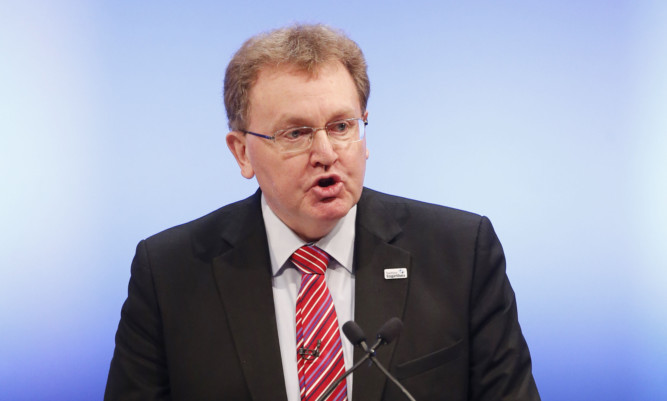The Scottish Secretary has called for a national debate on the devolution of power from Holyrood to local government.
David Mundell described the issue as “urgent” as he gave a speech in Glasgow, arguing that Scotland’s cities, towns and villages risk being left behind other parts of the UK if the Scottish Parliament does not “step up and send real powers to the people”.
He set out what he believes is a radically different vision of how the country could be governed, stating the case for devolution within Scotland should be “front and centre” of next year’s Scottish election campaign.
Under the plans, local authorities would have more control over areas like health, transport and policing while towns and villages could take more control over their own affairs.
The speech comes days after local authority leaders warned John Swinney’s latest budget plans will be “catastrophic” for jobs and services in councils.
The Scottish Finance Secretary has allocated £10.3 billion for local government as part of his spending plans for 2016, which local government body Cosla said amounted to a £350 million cut.
Mr Mundell said: “There is a revolution going on in local government across the rest of the United Kingdom, with local areas regaining power and responsibility at an unprecedented rate.
“It’s time we had a proper debate about devolution within Scotland.
“We don’t have time to delay – the debate needs to start now and it needs to be front and centre of the Scottish election campaign next year.
“The choices which the Scottish Government have made are significant. Serious cuts to local authority budgets and absolutely no new powers to raise their own funding.
“Councils across Scotland are rightly concerned about the futures they face and it is about time we had an honest and frank debate about it.”
The Scottish Secretary stressed he is not advocating a reorganisation of local government but bringing an end what he sees as a “one-size-fits-all” approach for councils.
He urged the Scottish Government to “follow the lead of the UK Government” in devolving powers to cities, counties and towns across the rest of the UK.
“On the crucial issue of breaking up the central government monolith, it’s now Westminster which is setting the pace and leading the way,” he said.
“There is now real risk that Glasgow, Edinburgh, Aberdeen, Dundee, and indeed the towns and counties of Scotland as a whole, will be left behind – stuck in a 1990s time-warp of centralised, Holyrood-dominance.”
A spokesman for Mr Swinney said: “David Mundell has just spent months opposing amendments to the Scotland Bill, refusing Scotland job-creating powers, so his calls now have absolutely no credibility.
“The Scottish Government’s approach is one of partnership with local government – it is an approach that varies substantially from that taken in some other parts of the UK and is based on a shared vision of strengthened community planning, engagement and empowerment.
“But our approach to devolution does not stop at local authority level and through, for example, the Community Empowerment Act and Land Reform Bill we want to help shift the balance of power more towards communities.
“Initiatives such as the Scottish Rural Parliament, and the Cities Convention, are also aimed at bringing people and policymakers together to enable better understanding, improved policy and greater empowerment of communities.
“These institutions, alongside action to ensure island communities benefit from the revenue of the Crown Estate, demonstrate our commitment to subsidiarity.”
